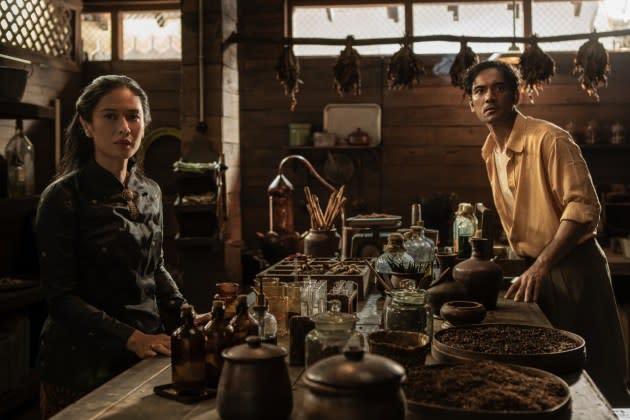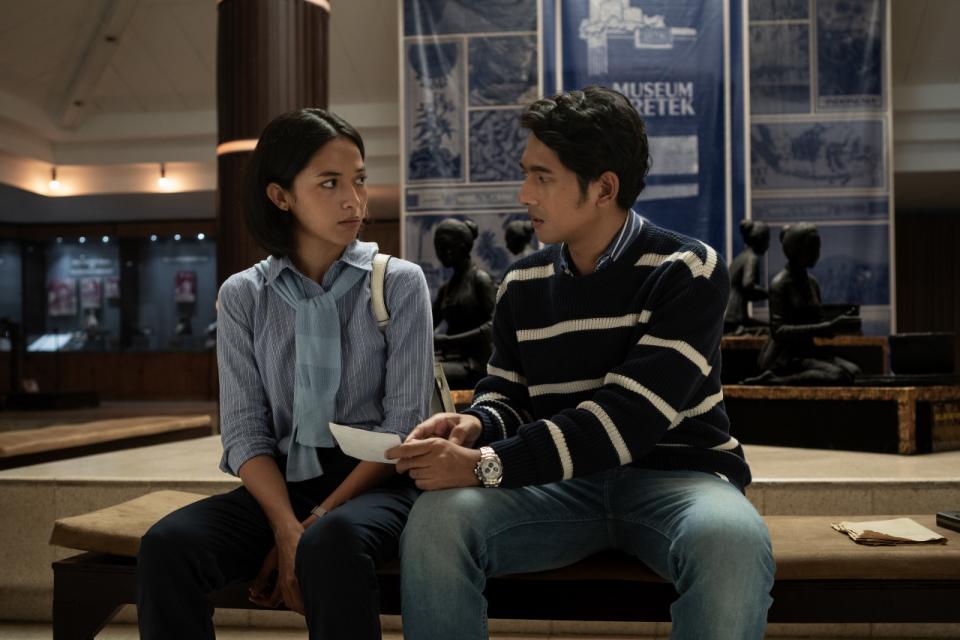Kamila Andini & Ifa Isfansyah On Recreating 1960s Indonesia in Netflix Period Romance ‘Cigarette Girl’

Indonesian filmmakers Kamila Andini and Ifa Isfansyah are making their Netflix debut with five-part series Cigarette Girl (Gadis Kretek), which streams worldwide from November 2.
Deadline sat down with the husband-and-wife filmmaking team, both award-winning arthouse directors in their own right, in Busan International Film Festival, where the first few episodes of the series world premiered as part of the festival’s Indonesia Special Program.
More from Deadline
Based on Ratih Kumala’s novel ‘Gadis Kretek’, the story spans two time periods – in the 1960s, the daughter of a family business producing Indonesia’s world-famous clove cigarettes struggles to make her mark in a male-dominated industry, while in the early 2000s, a young man is searching for a mystery woman to fulfil his father’s dying wish.
Dian Sastrowardoyo and Ario Bayu, both big stars in Indonesia, play the love struck main characters in the 1960s, while Putri Marino and Arya Saloka play a young woman and man trying to unravel their family mysteries in the early 2000s. The series is produced by Shanty Harmayn and Tanya Yuson’s Base Entertainment and scripted by Kumala, Yuson, Kanya K. Priyanti and Ambaridzki Ramadhantyo.
Isfansyah explains that the project originated with him several years ago when he read Kumala’s novel and wanted to make it into a film.
“It’s not an easy novel to adapt as the story is so complex,” Isfansyah says. “It has so many perspectives and spans three separate eras. At that time the Indonesian industry was not really strong enough to finance that kind of film, so we postponed the project, although we already had the script.”
Then around five years ago, when global and regional streamers started paying more attention to Indonesia, Harmayn suggested the adaptation might work as a series. Isfansyah agreed and then asked Andini to join him as co-director, marking a first for the pair.
“We’d worked together before as producer and director, never as co-directors, but I felt I couldn’t direct this alone as the story is told from a woman’s perspective,” Isfansyah explains. He adds that the team decided to drop the segment of the novel set in colonial era Indonesia in order to streamline the story.

Andini says: “I knew Ifa and Ratih had been dreaming for a long time about adapting this novel, and when Shanty suggested we make it as a series, I could see that much more would be possible in terms of the canvas and the story. It was also something new for me directing with Ifa as we both have our own style.”
Rather than direct separate episodes or scenes, Andini and Isfansyah worked together on set throughout the entire shoot – feeling their way in terms of who would direct each shot. “It was a very organic process in that there are certain things that Ifa knew I should handle, and other parts that I knew would be his strength,” Andini explains.
Andini had recently directed another historical drama, Before, Now And Then, also a woman’s story set in the same turbulent period in Indonesia’s history, which won best supporting actress at Berlin film festival in 2022. She is also known for female character-led films such as coming-of-age drama Yuni and magic realism-soaked tale The Seen And Unseen.
Isfansyah’s work as a director include 1960s-set romantic drama The Dancer and martial arts film The Golden Cane Warrior. He has also produced many award-winning films including Andini’s Yuni and Before, Now And Then and and Garin Nugroho’s Memories Of My Body.
In order to convincingly recreate 1960s Indonesia, Cigarette Girl was shot in seven different cities across Java on more than 100 sets. While some of the story is set in Jakarta, the modern-day capital is far too futuristic to recreate past decades and the Indonesian industry usually shoots on location rather than sound stages.
Andini explains that she took charge of many of the artistic elements involved in portraying Indonesia in the 1960s. “Usually when I direct, I have many concerns about the world we’re creating – not just the characters, but also the settings, wardrobe design, colour tones and other elements.” She adds that she also insisted on working with Batara Goempar, the same cinematographer she’d worked with on Before, Now And Then, as he had experience in shooting this time period.
She says that working with Netflix gave her and Isfansyah a bigger budget than they were used to working with, but also a greater responsibility to be audience friendly: “It’s a different mindset to the films I direct as an independent filmmaker, as we’re making this with an audience in mind, it’s not just about my vision.”
Isfansyah adds: “Right from the beginning we had the intention to make this a compelling historical drama and a love story, so not too tragic, although there are some dark elements in the story. The Indonesian audience is now really familiar with Korean drama, so that sets a certain expectation.”
The duo’s work in independent cinema, which has travelled widely to festivals all over the world, has given them an insight into the kind of Indonesian stories that can work outside of the country. Although international audiences may not be as familiar with Indonesian culture and history as some other part of Asia, the series has many universal elements – lush period settings, a turbulent historical backdrop, complex family dynamics and, most importantly for Andini and Isfansyah, a story of female empowerment.
“We wanted to make it as relatable as possible for all generations, but also make it realistic, which is why we’re both so excited by this,” says Andini. “We’ve never seen this kind of series or story in Indonesia before.”
Best of Deadline
Sign up for Deadline's Newsletter. For the latest news, follow us on Facebook, Twitter, and Instagram.
Solve the daily Crossword

